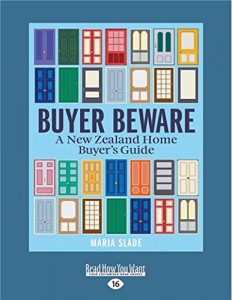As mortgage brokers we are always on the lookout for information that would be useful for people in the market to buy houses and those people that need mortgages too.
This is a book that most Kiwis will find useful; hence we have written this post to support it.
I’m not sure which bookshops stock this book but it’s available via Amazon which is what many of us now use as the online bookstore.
BUYER BEWARE – A New Zealand Home Buyers Guide
Some call this “the perfect handbook” for anyone buying a house in New Zealand today.
Buyer Beware – written by Maria Slade, a news journalist who has covered many of the horror stories related to bad property purchases.
Listen as she talks with Radio NZ’s Kim Hill about mortgages, leaky homes, building inspections and the media fixation on house prices. LISTEN HERE
Top Tips For Being Mortgage Ready
 Maria Slade gives us her top tips from the experts on being mortgage-ready in the NZ market.
Maria Slade gives us her top tips from the experts on being mortgage-ready in the NZ market.
Curb conspicuous consumption – if you take $100 out three times in one night at the casino it won’t go unnoticed, particularly if it happens regularly. The banks will examine your statements, and they take good account conduct seriously, so consider how your spending habits look.
So you need a budget, it needs to be realistic and you need to stick to it. As New Zealand mortgage broker we suggest some very clever and NZ made budgeting software called PocketSmith. There is a free version and a paid version, but what is great is you can download the past 3-months bank transactions which means you are using actual spending which is 100% more accurate. CLICK HERE to get yours today.
The value in valuations – if you take out a mortgage of over 80 per cent in a city such as Auckland or Hamilton, where prices are rising rapidly, put it on a fixed-interest rate for a short term and then get your property revalued. For example, one new homeowner took a higher interest rate for six months, and by the time the term ended prices had increased enough that the mortgage had fallen to under 80 percent of the home’s value. It meant the owner could get a more favourable interest rate. So consider short-term pain for long-term gain.
Of course this works better in a rising market but most years the market does go up,just some years values increase more than other years. You can also increase the value of your house by being smart with how you present it and what renovations you do.
Testing times – interest rates may be at a 60-year low, but lenders do not use these rates when assessing your ability to pay the mortgage. They need to build in a buffer to make sure you can still meet your commitments should interest rates rise — which inevitably they will. That buffer is called a ‘test rate’, and can be anything up to 2 percent higher than the current rates. For example, Westpac builds in test rates of 1–2 percent, depending on circumstances. It is worth bearing this in mind when doing your own back-of-the-envelope calculations on how large a mortgage you can take on, and how you would cope if the situation changed.
Banks are conservative and build in a buffer to test you can afford the loan. Once you are approved and have found a house then your mortgage broker should suggest a loan structure that fixes the interest rates for you and provides some certainty at least for the first few years.
Not all non-bank lenders are loan sharks – the finance company collapses of the previous decade cast a long shadow over the non-bank sector, and there is still a view that it is all payday lenders and extortionate interest rates. Non-bank lenders do price for risk and are therefore more expensive, but they provide a credible alternative when the main banks say no. Being declined by a bank can be for something as simple as forgetting to pay your credit-card bill before heading off on your OE. Even if you later sort it out, you will be blacklisted for five years. A non-bank lender, on the other hand, would happily have you. You will pay a slightly higher interest rate until the five years is up, but by then you will have re-established your credit history, enabling you to move to a main bank and get a better mortgage rate. So, consider it a waiting room.
My name is Stuart Wills and I have been a mortgage broker for over 20-years, so over that time I have established some very good relationships with non-bank lenders that can provide finance when the banks say NO. Generally we would use non-bank lenders for a short period of time until you are in a position where we could refinance your mortgage with a bank where we could get lower interest rates.
Please contact me to discuss your situation.
A warmer Welcome Home – although the government-backed Welcome Home Loans are supposedly exempt from the LVR restrictions, mortgage brokers have reported difficulty in getting lenders to accept them. However, the smaller banks such as The Co-operative Bank, SBS Bank and Heartland Bank are often more willing to take them on.
This book was written by Maria Slade in 2017 and since it was written things have gotten a little easier for first home buyers with the banks now able to provide a great number of low deposit home loans. The banks are still very careful, so they are still not readily available but your mortgage broker should know which banks can offer low deposit home loans at the time it’s needed.
Let’s pretend – every adviser will tell you that one of the best things you can do when preparing for the commitment of a mortgage is to pretend you are already paying it. Work out what it will cost you over and above your current accommodation costs each week, and put that aside. If the weekly home loan repayment is going to be $500 yet your rent is $250 and you have got nothing left come payday, the bank will question your ability to service that loan. While you may still get approval because the bank can see there is a lot of discretionary spending you can cut back on, it is a lot cleaner if you have sorted that out yourself and are already putting the money away.
This is very good advice – most people should be able to look at what they are paying in rent and what they are saving and that should be more than what the mortgage repayments will be. If you cannot save before you get a mortgage then you will be in for a shock.
In summary, this book will appeal to all home buyers, from first home buyers hoping for a small apartment or townhouse to older people looking to downsize and everyone in between. It explains about the concept of buyer beware and with chapters on the search, mortgages and legal aspects, types of title, buying at auction, buying off plans, checks and warning signs, bodies corporate and the special problems to be found in Christchurch, there is plenty of information for everyone.
Some call this “the perfect handbook” for anyone buying a house in New Zealand today and it’s a small investment in your future.


